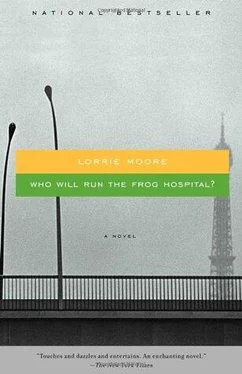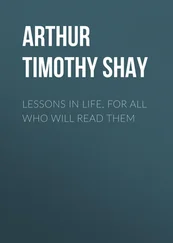Saved by America.
“What country do you think he’s from?” I asked Claude.
“Indonesia,” Claude replied. “Or maybe France. How should I know?”
Later I heard that Frank Morenton had fired Isabelle for her bad judgment, only to hire her back again the next day; I also heard she still got her car and her Christmas trip to Florida and that he bought Gloria Deb a bright red moped.
“Your daughter, of course, is fired,” he said to my parents. “But as for the money, let’s just call it even-steven.” Horsehearts was the sort of place where even a person of prominence might say things like “even-steven.” It was the sort of place where if you stayed too long, you might add or subtract syllables; you might ask for “ham burgs ” or “cheese burgs ” or “cream de mint .” After twenty years, you could end up saying “bingo” for “yes.”
“We greatly appreciate that,” murmured my father.
“Would you care to come in for some ice tea?” asked my mother.
“No, thanks,” said Frank Morenton. “I just wanted to hurry down here and tidy up, let you know that although I could, I’m not going to prosecute. Now we can just move on, put things behind us.”
“Yes,” said my mother.
“I hope you will do as I intend to do and not mention this to people.”
After that my parents said nothing Claude could discern.
“Now I’ve got to get back,” Morenton announced, and then he was gone, fast in his beautiful car, like a shiny, shiny god.
That’s how Claude described it later. I’d stayed in my room, as told. I’d stared at my Desiderata poster. Go placidly amid the noise and the haste.…
Go placidly.
What a crock.
The camp was a Baptist one a hundred miles away in the mountains on Lake Panawauc, said my parents, standing in my bedroom not long after Frank Morenton had left. I would be sent there until the end of August. Then I’d come back and pack for fall and winter. They were sending me away to boarding school.
“A military academy?” I asked, and no one in the room, myself included, knew whether I was joking.
“The Mount Brookfield School,” said my father. I was astonished that in my fifteen-minute ride from the lake to Horsehearts they had planned my future so specifically. “The financial arrangements we may have to work out with your grandmother. It would behoove you to pay her a visit and explain yourself.”
“Yup,” I said drily, “I guess it would.” We were all standing in my pink and purple room, with the Desiderata poster and the beehive shade and the records and the makeup mirror. I started playing with the dangling string of the light switch, turning it on and off, watching the beehive shade fill up with pink, and then empty again to white, watching the pink when it threw itself across my parents’ faces like a veil of embarrassment, then vanishing again like a passing fever, or the patrolling light from a squad car.
“What is wrong with you?” asked my father in a disgusted way, and I started to cry again because I didn’t know.
He turned angrily and walked out of the room, and my mother hesitated, then followed, though she cast me back a look that in another story might have turned me to salt or caused me to disappear entirely. Instead, in this one, it just left me there with the pink light, a large black moth banging at the screen, the sound of the Naval Reserve officers unit during the supper hour marching down the street, performing their summer exercises with low hums and scuffs and heps, to save our country, our world, our freedom! I threw myself on the bed, weeping. I dreamed a disinformation dream of Cuba.
That August the Republican convention renominated Nixon; he was “winding down the war,” like a kind of path.
Watergate was breaking.
Patty Duke got married.
A storm on the sun briefly remagnetized the earth.
I heard about these only in faint broadcasts from my counselor’s radio during rest hour. I lay in the bunk above Monica Hyde, a fourteen-year-old from North Syracuse. When I couldn’t hear the radio, I talked to her. Her biggest sin, she said, had been tearing the zipper off the Rolling Stones’ Sticky Fingers album cover so she could see what was underneath.
“Oh, I did that,” I said. “You were supposed to do that.”
“No, you weren’t,” she said. And I would contemplate my tanned arms, or the previous night’s vespers held in the cricket-chorused chapel (a cleared area of shore with log benches and Lake Panawauc itself as the pulpit). I passed the time being alternately bored and outraged by boredom, seeking new means of self-forgiveness and penance for my crimes. I fell slightly in love with the camp director’s son, a boy my age named Hayden Filo who had been a thalidomide child and who had only three fingers and six toes. After vespers we would sometimes walk through the woods together and he would talk about God, never Jesus, never the Son! Just God, and what God wanted — in ways that sometimes made God seem as gorgeous and enveloping as the violet dusk in which we roamed, and other times like a spoiled and faraway child vexing all his relations.
Sometimes we stopped, by trees and rocks and forks in the path, and kissed. Tree crickets and katydids sang with the ceaseless squawk of a clothesline pulley, all that endless hanging of laundry in the night. Please! We don’t want to hear about it! We lifted our hands and held each other’s faces. We closed our eyes, then oddly, without warning, opened them again. We stayed up late and watched for the northern lights, which came a lot now because of the storm on the sun. They looked like car headlights flashed across the sky, and sometimes failed to impress us. Other times they seemed as miraculous as the angels and we could feel ourselves under their spell and full of kindness and light, our dark, accidental pasts far away.
I won a sword drill competition. I knew the Bible like my own closet (Leviticus 14:10! Green knit crochet vest!). Somehow it was all the same, all paraphernalia my brain had seized and catalogued in a kind of heartless, automatic way. My brain sought always to make the strange familiar, available, not scary. It built railings, ways to get around, maps and roads. It farmed and planted with a panicked, compulsive, mechanical energy. And so I won the Bible drills.
I came in second in a back-dive contest.
I sang “Were You There When They Crucified My Lord?” in a solo, in front of everyone, at Sunday service. At the end no one clapped, but you didn’t at a church service. That was one of the things that was too bad about church.
I wrote long letters to Sils, making up grotesque but harmless accounts of the other girls in my tent—“They eat dirt!”—but not telling her about the three-fingered boy I was kissing in the woods. At vespers I actually prayed hard to God and on several occasions believed I felt the Holy Spirit enter me then silently cry out and flee. One day after lunch I made an appointment to see Reverend Filo, the camp director. I sat in his office in the back of the main lodge and regarded him steadily. “I want to be baptized,” I explained. I didn’t know whether he knew about the walks I was taking with his son.
“You haven’t been baptized before?”
“No,” I lied. It was the last lie, the necessary lie, the great lie to end all lies; the Jesus lie, lying for the sins of all the other lies.
Reverend Filo looked at me. I had no idea what my parents had told him. “You weren’t baptized when you were twelve like everyone else?”
“I had mono,” I said. The deputy lie. The good-thief-on-the-cross lie. I had been baptized when it meant nothing to me. Now I needed the public atonement—“At-One-ment,” as they said here at Camp Panawauc over bug juice and guitar-strummed hymns. I needed the ritual and spectacle. I needed to fall back against a religious man’s arms, to be blessed and taken up into the clouds briefly, feel Jesus seize my heart and stay there not shriek and fly off. That hadn’t happened the first time. The first time my head had been full of thoughts of breakfast and about how under my baptismal gown, in front of the entire congregation, I wasn’t wearing any underwear. Afterward, I’d gleefully eaten donuts and hot chocolate with the other baptismal “candidates,” as they were called, while the church ladies dried our hair with towels and a bonnet dryer.
Читать дальше












